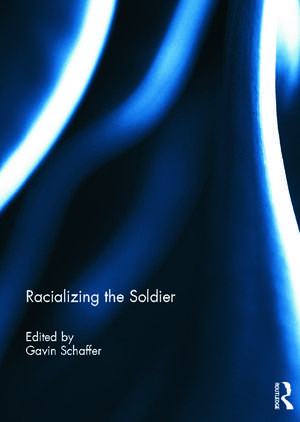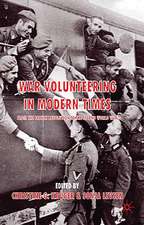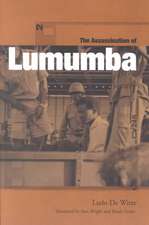Racializing the Soldier
Editat de Gavin Schafferen Limba Engleză Hardback – 12 iun 2013
This volume offers a highly original military, social and cultural history, questioning the borders both of racialization and of the military itself. It considers the extent to which discourses of gender, nationality and religion have informed racialization, and probes the influence of expert studies of soldiers as indicators of national population types. By focusing mostly, but not exclusively, on colonial and post-colonial states, the book considers how racialized militaries both shaped and reflected conflict in the modern world, ultimately explaining how the history of this idea has often underpinned modern military planning and thinking.
This book is based on a special issue of Patterns of Prejudice.
| Toate formatele și edițiile | Preț | Express |
|---|---|---|
| Paperback (1) | 260.13 lei 6-8 săpt. | |
| Taylor & Francis – 14 oct 2024 | 260.13 lei 6-8 săpt. | |
| Hardback (1) | 607.02 lei 3-5 săpt. | +25.37 lei 7-13 zile |
| Taylor & Francis – 12 iun 2013 | 607.02 lei 3-5 săpt. | +25.37 lei 7-13 zile |
Preț: 607.02 lei
Preț vechi: 667.05 lei
-9% Nou
Puncte Express: 911
Preț estimativ în valută:
116.17€ • 121.13$ • 96.55£
116.17€ • 121.13$ • 96.55£
Carte disponibilă
Livrare economică 27 februarie-13 martie
Livrare express 13-19 februarie pentru 35.36 lei
Preluare comenzi: 021 569.72.76
Specificații
ISBN-13: 9780415626170
ISBN-10: 041562617X
Pagini: 246
Dimensiuni: 174 x 246 x 20 mm
Greutate: 0.59 kg
Ediția:New.
Editura: Taylor & Francis
Colecția Routledge
Locul publicării:Oxford, United Kingdom
ISBN-10: 041562617X
Pagini: 246
Dimensiuni: 174 x 246 x 20 mm
Greutate: 0.59 kg
Ediția:New.
Editura: Taylor & Francis
Colecția Routledge
Locul publicării:Oxford, United Kingdom
Public țintă
Academic and PostgraduateCuprins
1. Racializing the soldier: an introduction Gavin Schaffer 2. Making bodies modern: race, medicine and the colonial soldier in the mid-eighteenth century Erica Charters 3. Recruiting the ‘martial races’: identities and military service in colonial India Gavin Rand and Kim A. Wagner 4. Women and warfare at the start of the twentieth century: the racialization of the ‘enemy’ during the South African War (1899-1902) Zoë Denness 5. ‘The Negro should not be used as a combat soldier’: reconfiguring racial identity in the United States Army, 1890-1918 Bobby A. Wintermute 6. The language of sacrifice: masculinities in Northern Ireland and the consequences of the Great War Jane G. V. McGaughey 7. Creating difference: the racialization of Germany’s Jewish soldiers after the First World War Tim Grady 8. In search of racial types: soldiers and the anthropological mapping of the Romanian nation, 1914-44 Marius Turda 9. ‘Without intending any of the most undesirable features of a colour bar’: race science, Europeanness and the British armed forces during the twentieth century Tony Kushner 10. Unmasking the ‘muscle Jew’: the Jewish soldier in British war service, 1899-1945 Gavin Schaffer 11. The embodiment of British Italian war memory? The curious marginalization of Dennis Donnini, VC Wendy Ugolini
Notă biografică
Dr Gavin Schaffer is Senior Lecturer in British History at the University of Birmingham, UK. His research interests include race and immigration history, racial science, race and the media and the history of racial violence. Previous publications include Racial Science and British Society 1930-62 (2008) and The Lasting War: Society and Identity in Britain, France and Germany after 1945 (2008).
Descriere
Racializing the Soldier offers an international history of the impact of racial beliefs on the formation and development of modern armed forces. Focusing mostly on colonial and post-colonial armies, it considers how the idea of race shaped military conflict in the modern world.
This book was originally published as a special issue of Patterns of Prejudice.
This book was originally published as a special issue of Patterns of Prejudice.














